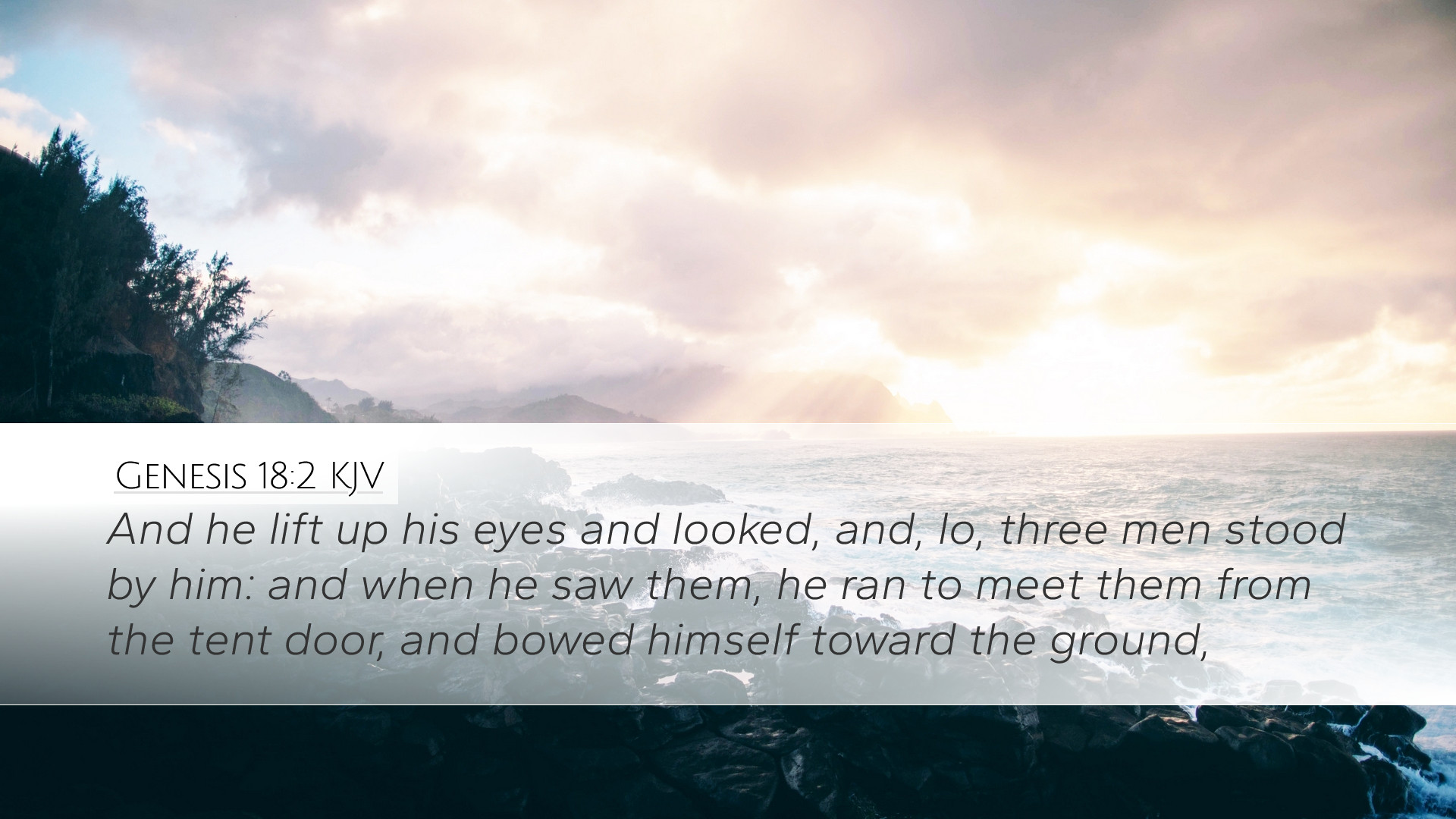Commentary on Genesis 18:2
Verse Text: "And he lifted up his eyes and looked, and lo, three men stood by him: and when he saw them, he ran to meet them from the tent door, and bowed himself toward the ground."
Introduction
This profound moment in Genesis 18:2 marks a pivotal encounter in biblical narrative, unfolding themes of hospitality, divine intervention, and the covenant promise. The setting signifies Abraham's home as a place where heaven meets earth—an emblem of the sacred in the everyday.
Contextual Analysis
The text occurs within the broader context of God's covenant with Abraham, where promises of blessings and descendants are reiterated. This specific appearance of God, alongside two angels, serves to emphasize the intimate nature of divine revelation.
Exegesis
Matthew Henry in his commentary stresses the importance of the posture and attitude of Abraham in this event. His running towards the men is indicative of both eagerness and reverence, highlighting the cultural norms of hospitality in ancient Near Eastern societies.
Significance of the Three Men
The presence of three men captures immediate theological attention. Albert Barnes notes that these figures are understood by many as divine beings, possibly the pre-incarnate Christ and two angels, which speaks to the typological significance in Scripture—pointing forward to the trinitarian concept in Christian theology.
Abraham's Response
Abraham's act of bowing illustrates profound respect. Adam Clarke emphasizes the significance of this humility, portraying Abraham not just as a patriarch but as a servant. His response serves as a model for all believers regarding the proper approach to divine encounters.
Thematic Exploration
- Hospitality: The Old Testament places immense value on hospitality. Abraham’s eagerness to receive the guests can be seen as an embodiment of this virtue, which is critical to understanding our relationship with one another and with God.
- Divine Revelation: The appearance of these men signifies God's communication with humanity. As elaborated by Barnes, such divine encounters should remind believers of the ways God may choose to reveal His plans and purposes.
- Covenant Renewal: This moment serves as a precursor to the announcement of Isaac’s birth, reiterating the covenant promise. Matthew Henry provides insights into how each interaction with these divine beings serves to deepen Abraham’s faith.
Practical Applications
Pastors and theologians can draw lessons from Abraham's conduct in this passage, encouraging congregations to embrace both the spirit of hospitality and the significance of acknowledging divine presence in mundane situations.
- Embracing Hospitality: How can we cultivate a culture of hospitality in our churches and communities? Abraham’s example calls us to greet strangers with warmth and respect.
- Seeking Divine Encounters: Are we attuned to how God might be revealing Himself in our daily lives? Clarke encourages believers to stay expectant and receptive to God’s guidance.
- Faith in God’s Promises: Abraham's reaction models a faith that is eager and respectful. This passage challenges believers to trust in God’s timing for promises yet to be fulfilled.
Conclusion
Genesis 18:2 serves as a rich source of theological reflection and practical application. By examining Abraham’s encounter with the divine in this passage, we are reminded of the importance of hospitality, the revelation of God, and the unfailing nature of His promises. This encounter invites us into a deeper relationship with God and each other, highlighting the need for reverence and respect in our faith journeys.
Further Reflection
As we meditate on this passage, let us consider the implications it has on our own lives and how we might embody the virtues displayed by Abraham in our contemporary contexts. What does it mean to live in anticipation of God’s presence and promise?


